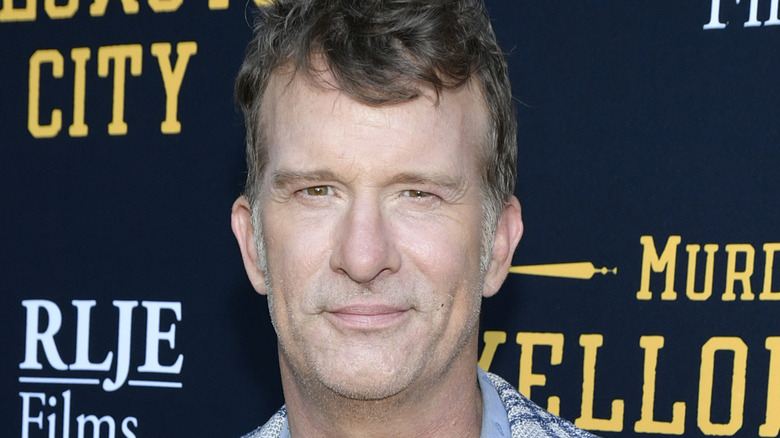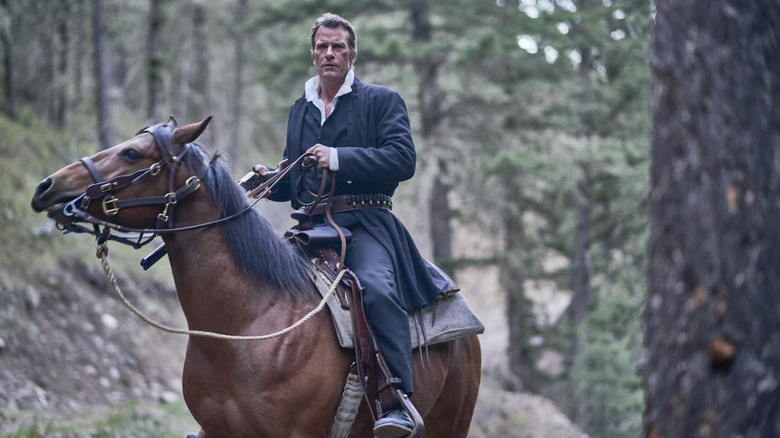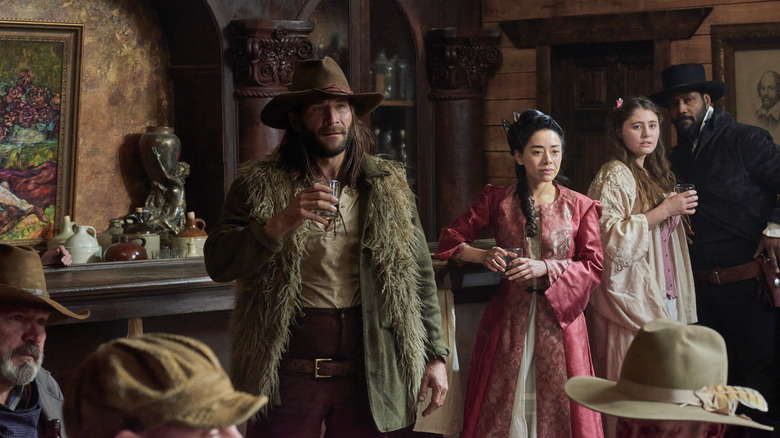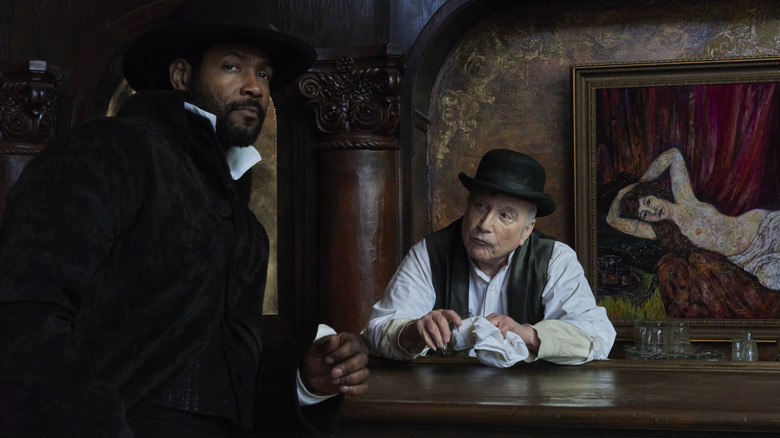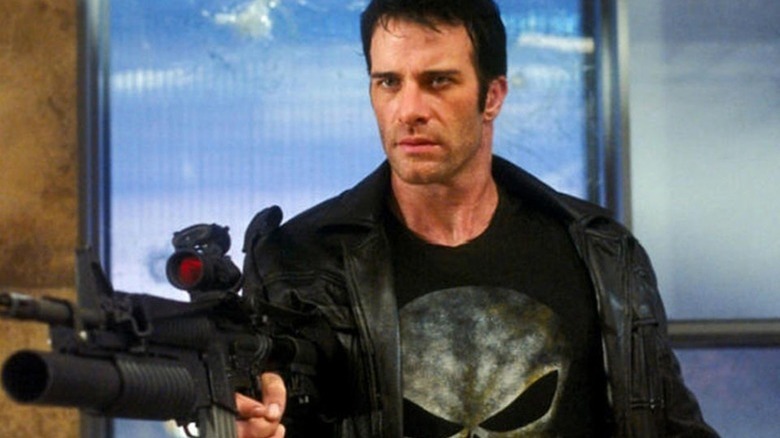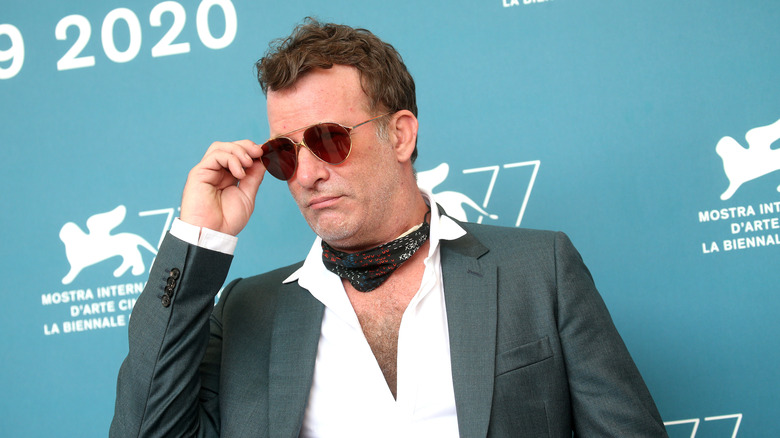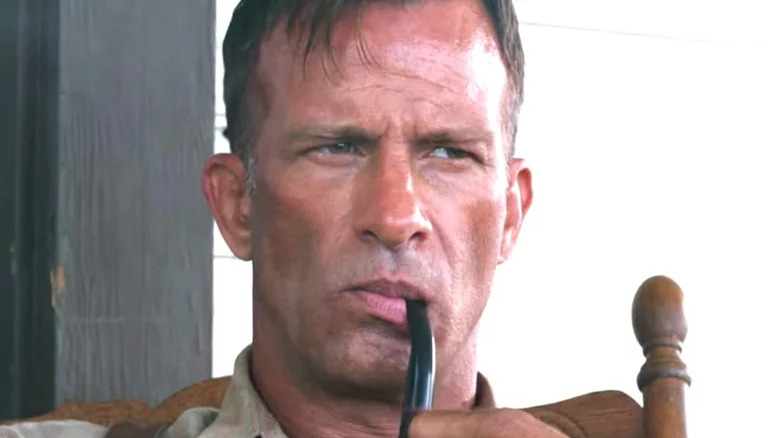Thomas Jane Discusses Murder At Yellowstone City, The Punisher, And More - Exclusive Interview
Thomas Jane has had an impressive career — one that's hard to define. He has starred in blockbuster popcorn flicks like "Deep Blue Sea" and "The Predator" while also appearing in critically acclaimed fare such as the Academy Award-nominated "Boogie Nights," the beloved made-for-TV baseball film "61*," and the edgy HBO series "Hung."
Jane's most recent movie, "Murder at Yellowstone City" — which is now in theaters and available on demand and digital — sees him starring as Thaddeus Murphy, an Old West preacher with a dark past who becomes embroiled in a small-town murder mystery. The neo-noir American Western also stars Gabriel Byrne, Richard Dreyfuss, and Isaiah Mustafa.
During an exclusive interview with Looper, Jane sat down to discuss why he's "proud" of making "Murder at Yellowstone City" and looked back on some of his past work, including giving some insight into why he thinks "The Punisher" failed to take off at the box office.
Jane had an absolute ball filming Murder in Yellowstone City
We're here to talk about your latest film, "Murder at Yellowstone City," which you not only star in but also executive produced. With the hit series "Yellowstone" and its prequel, "1883," Westerns are all the rage these days. Why was this film an exciting opportunity for you?
Well, I'm a big fan of Westerns. This is the second Western that me and my company, Renegade [Entertainment], did. Me and my partner, Courtney Penn, started Renegade in 2019. In the year 2020, during the pandemic, when everybody was cooped up inside, we were out riding horses and shooting guns in the great state of Montana. We had an absolute ball. These are some of the first things [filmed during the pandemic] that are rolling out and hitting the market now — that and my television show "Troppo," which you can find on Amazon Freevee. It's also doing very well.
We're proud of the work that we're doing. We particularly love Westerns. Our logo is a horse that's made of fire. I hope to be one of many that is a good one. I hope that it does well and that we start bringing back more and more Westerns ... You're right [that Westerns are making a comeback]. It was kicked off with the television show "Yellowstone," which sparked the revival and the interest of Westerns. But you've got to make good ones if you want the streak to continue.
You don't want to end up with a "Heaven's Gate" — which, by the way, was a terrific film, but a terrible failure at the box office in 1980, which then created a desert of Westerns for the next 10 years. The 1980s are basically devoid of Westerns until we hit "Dances With Wolves" and "Unforgiven" in the early 1990s that revived the Western for a while. And then they died out again.
Now, they're back. It's the great American myth, the Western. Along with jazz and baseball, they're truly American creations and they've got legs. I hope to enjoy many Westerns to come in the future with me and my company, Renegade.
He sees Westerns as a microcosm of society
Why do you think Westerns are so enduring and beloved, and what makes them appealing as an actor?
As an actor, you get to ride horses and shoot guns and save the woman and mess with the bad guys and stand up for justice and what's right. The Western is enduring because it's real simple. It explores that conflict between individual freedom and the duty that you have to society. Society is usually represented by the town in a Western, and the town is besieged by some kind of evil, whether from the inside — like a corrupt sheriff, as our film deals with — or the outside, like a band of outlaws that come to rape and pillage. The town is either basically good, but weak and in need of some sort of defense, or it's strong, but bad and corrupt in a way.
The outsider comes in. He's not a part of the society; he's shunned by the society for one reason or another. Then, he is revealed to have special skills — he's an exceptional gun fighter or some other special skill, and he's uniquely positioned to take on the villainy that is corrupting or plaguing the town. We see real simple archetypes that connect with us, because they're everyday problems that we all deal with. We're all searching for our individual freedom and the right to be left alone and do what the hell we want with our lives — as long as we're not hurting anybody — and the duty that we owe to society that allows us to be free. These simple concepts refuse to die, and I think that's why.
Richard Dreyfuss kept him entertained on the set
What was the most challenging part of filming "Murder at Yellowstone City"?
We had a brand-new town that was built just for the movie, which has since been rented out to other Westerns, but we were the first film to shoot in Yellowstone City. We were shooting in Montana during COVID, but fortunately, we were isolated enough that we never were touched by the whole pandemic thing. There are pockets of America where life pretty much went on as usual, outside of not being able to get baby formula or something sometimes.
I got to tell you, there wasn't any downside to shooting in Montana. The weather was great. The actors were spectacular. The script was good. We all had fun. I'm a pretty good horse rider, so I had a great time on a horse. Some of the other actors weren't. It's to be expected — they're city boys. But I can't think of anything that was wrong with it at the moment.
You mentioned having fun. Even though it was a pretty serious film, did you have a lot of laughs on the set? Are there any funny moments that stand out for you?
That's funny. People ask me that. Every day, somebody's cracking up or something's happening. It's a community of people, and if they like what they're doing, they're generally in a good mood and everybody's working hard and we have fun. If somebody couldn't ride a horse, we'd make fun of that.
There's always some kerfuffles when it comes to stunts and stuff, trying to get those right — [that] usually makes for a good blooper reel. But I really enjoyed the cast and the crew. It may be serious when we're shooting, but when we're not shooting, we're a bunch of professionals who love what we do.
Richard Dreyfuss, in particular, was fun to work with. He's a spry guy and quick with a joke or to light up your smoke, and [he has] great stories about the old days of Hollywood in the 1970s and '80s. It's really nice to spend some time with the old veterans of the profession that you love. Those were special days when I got to work with Dreyfuss.
He thinks the world wasn't quite ready for The Punisher
You've played all different kinds of roles over the course of your career. You certainly can't say you've been pigeonholed. When you look back, what have been some of the biggest highlights? Any favorite films or series?
My favorite shooting experience was shooting "61*," which was a baseball film directed by Billy Crystal. I got to train with Reggie Smith. We got to play baseball all day and make a movie. That was a highlight.
It's also a very good film. It was inducted into the Baseball Hall of Fame a few years ago in Cooperstown. It's well appreciated amongst baseball aficionados. We worked hard to get it right and make sure the actors looked like they knew what the hell they were doing. Billy recreated each play, each inning of that season, 1961. Billy knew it all from the Yankees' perspective, backward and forward. Every single inning and every base hit, every fly ball — those are all recreations of an actual event from the actual season of the Yankees in 1961. That was really, really special.
Going back to 2004, when you starred in "The Punisher" ... Since then, Marvel has become an even bigger juggernaut than ever. Does anything in particular stand out from shooting that film?
2004 was a period when they were still trying to figure out the tone of what worked as a "Marvel film." "The Punisher" stands outside of the canon because he's the only anti-hero. We had a little difficulty finding the tone of what an anti-hero Marvel movie would look like. In fact, they've abandoned that model, and we haven't really seen the anti-hero in Marvel comic book production since then. It was also before "The Dark Knight" had come out, and "The Dark Knight" leaned into the gothic noir, gritty tone that I wanted from the original "Punisher."
But that movie hadn't come out yet and blown people away, so people had trouble latching on to the darker tones of what "The Punisher" required. I went on to do a short film, which you can look up on YouTube right now. It's called "Dirty Laundry," which was my homage to what I believe the character Frank Castle could be and should be. I'm proud of that. It's got quite a lot of views and people appreciated it. Check that out on YouTube if you're into that kind of thing.
He dabbles in comic book writing
You write comic books yourself. Can you tell me how that unfolded? My assumption would be you've been a comic book fan for a long time to want to do that.
You'd be right. I've always been a real fan of the science fiction comics and the horror comic books and the Western comic books, and just about every comic except for the superhero comics. There's a wide variety, and comic books are an American creation — although that's not entirely true, but we created the comic book industry, for sure. I've always been in love with it, always loved the artists and had a great affinity for the comic books from the 1950s. They were called pre-code comics. The comics code came in the mid-'50s and ruined everything. Before then, you could get away with guys on the cover with a bullet in their head or a decapitation or somebody's face melting from radiation.
When the comics code came in, they poo-pooed that stuff and said we were corrupting the minds of children, so that golden era ended, but it was revived in the 1970s with underground comix. That's where Robert Crumb comes from, for example, and other amazing artists like Charles Burns, who created "Black Hole." There's some really, really great art coming out of that, the independent comic book realm. That's what I wanted to create.
I created a company called Raw Studios and started writing some sci-fi books. I had a lot of fun with it. "Bad Planet" is one. "Alien Pig Farm 3000" is another, which is about rednecks versus aliens. It's got a tongue-in-cheek sense of humor. It's also very good. Then, I recently [finished] up a book called "The Lycan," which is a werewolf tale set in the late 1700s about a group of hunters coming back from Africa who get stranded on this little British isle, and they end up confronting this group of werewolves.
I'm actually looking for an artist for that right now. We've got a script and we're looking for the right artist. It takes time if you want to do it right, but that might be the last book that I do for a while. I had a lot of fun [and] learned a lot. You learn a lot working with artists and writers and colorists and printers, which all bleeds over into my understanding of film and working with cinematographers and production designers and writers. It's been a learning experience for me, and also gratifying. I get to contribute in some small way to the world of graphic novels and comic books.
He's working on a new Stephen King film
Like the rest of your career, you have starred in three wildly different Stephen King adaptations. What is it about King's material that consistently speaks to you as an actor?
I've been fortunate. I've done three King projects: "Dreamcatcher," then I did "The Mist," and then I did "1922" for Netflix. They're all interesting in their own way, and as an actor, I've been pretty fortunate. As a producer with Renegade [Entertainment], which produced "Murder at Yellowstone City," we've also got the rights to a Stephen King book called "From a Buick 8," one of his lesser-known but highly regarded stories.
It's his only novel, I believe, to take place outside of Maine. It takes place in Pennsylvania, following a group of state troopers. They encounter this other-worldly car from another dimension. Of course, mayhem ensues, but it's really a character piece about this tight-knit group of state troopers, trying to deal with the unknown, the mysterious, and how that affects our world and how it affects each individual trooper. Their personal grappling with this ultimate mystery is what makes the book so great. We're in the process of developing that and turning it into a miniseries. Look out for "From a Buick 8" in the next couple years.
"Murder at Yellowstone City" is now in theaters and available on demand and digital.
This interview was edited for clarity.
